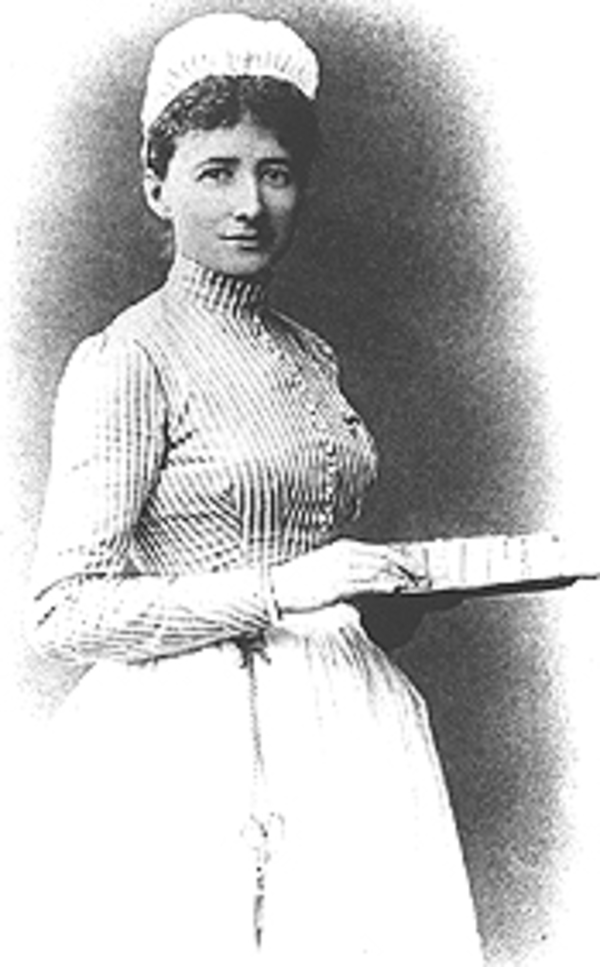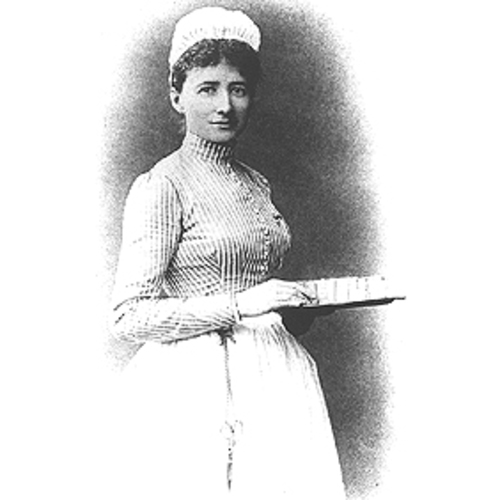
Source: Link
WYLLIE, ELIZABETH JENNET (McMaster), philanthropist, hospital administrator, and nurse; b. 27 Dec. 1847 in Toronto, second daughter of George Black Wyllie and Mary Ann Reid; m. there 1 June 1865 Samuel Fenton McMaster, and they had two sons and two daughters; d. 3 March 1903 in Chicago.
Elizabeth Jennet Wyllie McMaster’s career, like those of many women of her class and era, combined family connections, religious faith, and membership in voluntary women’s associations in the service of philanthropy. The daughter of a woollen-draper and dry-goods merchant who was a founder of the firm Wyllie and Murray, she grew up in a family that stood just on the fringe of Toronto’s high society. Marriage positioned her firmly on the second rung of the city’s social ladder. Her husband worked at A. R. McMaster and Brother, the dry-goods firm established by his uncle Senator William McMaster*. He brought her financial security and an extensive family network that included Susan Fraser, née Moulton, the senator’s second wife, Margaret Cronyn, the wife of Edward Blake*, Lady Macdonald [Bernard*], John Ross Robertson*, and Edmund Boyd Osler*. McMaster joined the women of this group in charitable work.
McMaster spent the first ten years of her marriage bearing children and visiting the poor; thereafter she devoted her energies to medical causes. Work with the poor had convinced her that Toronto desperately needed a hospital for sick children. On 19 Dec. 1874 she provided the financial impetus for such an institution, the first in Canada, by anonymously donating ten dollars. Convinced that others would follow her example, she ensured that this gift received wide publicity. She then managed the donations that followed and used them to rent the house in which the Hospital for Sick Children was opened in March 1875. She also organized a ladies’ committee – which included Lady Macdonald, Mrs Blake, and a Miss Jarvis – to manage finances and operations. Between 1875 and 1883 she served, intermittently, as secretary of the committee, and from 1884 until 1891 she was its president.
A deeply religious woman, McMaster was convinced that hers was a “work of faith.” She never solicited funds publicly for the hospital and would turn “to no one but our God for all we need.” According to the annual reports of the hospital, she regularly led the ladies’ committee in prayer for charitable gifts. The committee’s minute-books indicate, however, that the women did far more than pray. Between March 1875 and 1878 they oversaw the daily operations of the hospital, supervised staff, visited patients, offered religious and secular instruction, and twice procured larger buildings to accommodate growing numbers of patients. In March 1878 McMaster responded to increasing demands on the hospital’s limited resources by recommending “the appointment of an advisory committee consisting of 3 or 4 gentlemen to advise on business matters and to act as Trustees for the hospital in the purchase and holding of property.”
McMaster may not have appreciated in all respects the consequences of this attempt to secure the hospital’s future. Previously her strong personality had left its imprint on all hospital affairs, but she now met with opposition from the board of trustees, led by John Ross Robertson, on questions of finance and the location of a new, permanent hospital (the trustees favoured a site downtown; McMaster preferred one in Rosedale). “Fully convinced that she had been led by the Spirit of God to found the Hospital,” she resolved that “having accepted the work as from God, she could never resign it, and therefore the only alternative for those who could not work harmoniously or satisfactorily with herself . . . [was] to withdraw.”
Despite the disagreements, McMaster retained control over hospital operations until the 1890s. In 1886 she helped found its Training School for Nurses. As plans to move to a permanent site at 67 College Street progressed, McMaster prepared to “qualify herself more fully for the duties of Presiding Officer” by pursuing a formal course in nursing. Four months after the death of her husband on 8 Oct. 1888, she went to study at the Illinois Training School for Nurses. Having graduated with highest honours in 1891, she returned to Toronto that May and resigned her position as president of the ladies’ committee in order to become the first superintendent of the Hospital for Sick Children. Her conflicts with the trustees resumed on both medical and financial matters. In addition to her work with the hospital, she took an interest in furthering medical knowledge, delivering a lecture to the Young Women’s Christian Guild “On medical and surgical emergencies . . . what an untrained woman can do,” which is considered the city’s “first First Aid Course.”
On 26 Dec. 1891 McMaster contracted diphtheria. She returned to work a month later, but soon thereafter “circumstances” – whether related to poor health or continuing disagreements with the trustees – obliged her to resign. At the formal opening of the new hospital building on 6 May 1892, McMaster was presented with “an engrossed address, a purse of gold, and an album of Hospital photographs.” She immediately left Toronto for the United States.
Little is known of McMaster’s life after her departure. Some sources indicate that she moved to California to recuperate her health. She is credited with having organized the Hospital of the Good Samaritan in Los Angeles and with having reorganized the Children’s Home in Schenectady, N.Y. She returned to Chicago sometime before her death there in 1903.
Hospital for Sick Children Arch. (Toronto), [S. R. Hart], “Hart family diary, 1842–1966,” [comp. Marion Key] (typescript, [1966]); Hospital for Sick Children, Committee, minutes of meetings, 1876–90; Elizabeth McMaster biog. file. St Paul’s (Anglican) Church (Toronto), RBMB, 2 April 1848. Chicago Daily Tribune, 3 March 1903. Evening Telegram (Toronto), 6–7 Sept. 1889. Globe, 3 June 1865; 26 Oct. 1866; 5 March 1903: 14. World (Toronto), 11 June 1889. Jean Bannerman, Leading ladies, Canada (Belleville, Ont., 1977), 92–93. Max Braithwaite, Sick Kids: the story of the Hospital for Sick Children in Toronto (Toronto, 1974). Directory, Toronto, 1837–67. Hospital for Sick Children, Annual report (Toronto), 1876–1904. The Hospital for Sick Children, College Street, Toronto; the Lakeside Home for Little Children . . . history of these institutions (Toronto, 1891). [Josephine Kane], The history of the Hospital for Sick Children, College Street, Toronto, Ont., Canada, and the Lakeside Home for Little Children . . . (rev. ed., Toronto, 1918). H. [R.] Rolstin, The Hospital for Sick Children School of Nursing, Toronto (Toronto, 1972). Eanswythe Rowley, “The founder of the Hospital for Sick Children, Mrs. S. F. McMaster,” Toronto Calling (Toronto), 1 (1951), no.8: 15 (copy in Elizabeth McMaster biog. file, Hospital for Sick Children Arch.). Women and medicine in Toronto since 1883: a who’s who, comp. Rose Sheinin and Alan Bakes (Toronto, 1987).
Cite This Article
Gina Feldberg, “WYLLIE, ELIZABETH JENNET (McMaster),” in Dictionary of Canadian Biography, vol. 13, University of Toronto/Université Laval, 2003–, accessed January 1, 2026, https://www.biographi.ca/en/bio/wyllie_elizabeth_jennet_13E.html.
The citation above shows the format for footnotes and endnotes according to the Chicago manual of style (16th edition). Information to be used in other citation formats:
| Permalink: | https://www.biographi.ca/en/bio/wyllie_elizabeth_jennet_13E.html |
| Author of Article: | Gina Feldberg |
| Title of Article: | WYLLIE, ELIZABETH JENNET (McMaster) |
| Publication Name: | Dictionary of Canadian Biography, vol. 13 |
| Publisher: | University of Toronto/Université Laval |
| Year of publication: | 1994 |
| Year of revision: | 1994 |
| Access Date: | January 1, 2026 |



